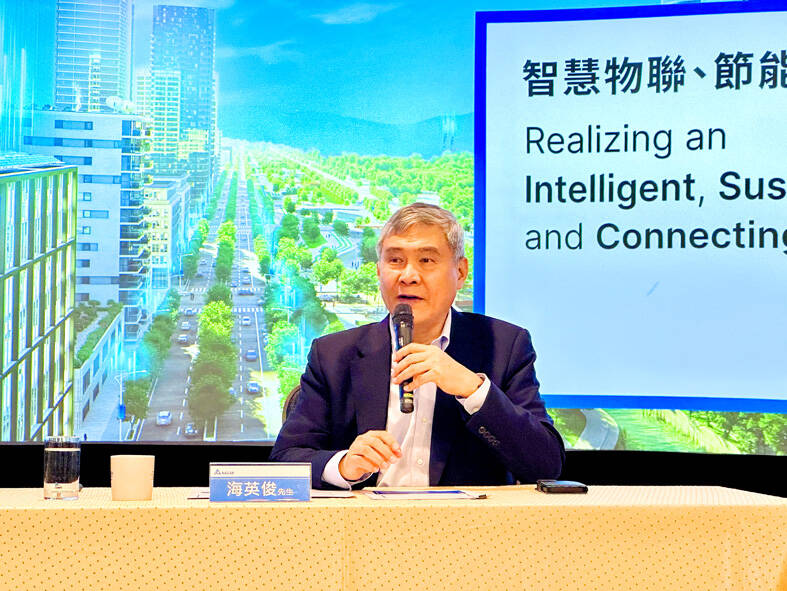Power supply and electronic components maker Delta Electronics Co (台達電) yesterday reduced the revenue growth forecast for its electric vehicle (EV)-related products from an annual expansion of 100 percent to at least 80 percent due to disappointing EV sales.
Next year, the growth rate would be about 40 to 50 percent, given this year’s higher comparison base, Delta chairman Yancey Hai (海英俊) told investors at a quarterly meeting in Taipei.
“The UAW [United Auto Workers] strikes [in the US] had a limited impact on the company as the strikes targeted non-EV companies. It is good to hear that the issue was resolved,” Hai said.

Photo: Fang Wei-chieh, Taipei Times
The EV market is facing headwinds due to the high price of vehicles and heavy loan rates caused by the US Federal Reserve’s interest rate hikes, Hai said.
Tesla Inc has had to cut prices to stimulate sales, and competitors are likely to follow suit, he said.
However, the short-term slowdown would not affect the long-term EV “mega trend,” as most countries aim to retire fossil fuel-powered vehicles, Hai said.
Besides, many automakers have new models in the pipeline, he added.
Delta expects its EV-related business to turn a profit this year as planned, Hai said.
The company’s EV business would pass the break-even point of US$100 million this year, and is expected to bring in revenue of US$1.4 billion to US$1.5 billion, Hai said.
Overall, the EV business is expected to account for about 12 percent of the company’s total revenue this year, Delta CEO Cheng Ping (鄭平) said, adding that he expects its revenue contribution to increase next year.
Delta yesterday launched a new mobility business group, spinning its EV powertrain system business off from other groups.
Artificial intelligence (AI) is another growth engine for Delta as Internet service providers are racing to build more data centers to tap into the fast-growing AI applications market, Hai said.
Delta supplies power supplies used in AI servers, and its power supply business makes up about 15 percent of the company’s revenue.
For this quarter, Delta expects revenue to be little changed from a record level of NT$107.8 billion last quarter, given the lukewarm performance of its consumer electronics, telecom infrastructure, and industrial and building automation segments.
“We believe next year will be a better year than this year when customers clear excess inventory,” Cheng said.
Delta on Tuesday posted net profit of NT$9.3 billion for last quarter, up 15 percent from NT$8.2 billion in the second quarter, but down of 15 percent from NT$11.1 billion a year earlier.
Earnings per share rose to NT$3.6 from NT$3.14 a quarter earlier, but slipped from NT$4.26 a year earlier.
Its power and electronic components business reported profits of NT$10.84 billion last quarter, up 18 percent sequentially and 8 percent annually.
Profits at its automation business dropped 5 percent quarterly and 43 percent annually, while its infrastructure businesses reported a decline of 8 percent from the second quarter and 81 percent from a year earlier.
On a consolidated basis, gross margin improved to 29.6 percent last quarter, from 29.2 percent in the second quarter, but dropped from 30.3 percent in the third quarter of last year.

South Korea’s equity benchmark yesterday crossed a new milestone just a month after surpassing the once-unthinkable 5,000 mark as surging global memory demand powers the country’s biggest chipmakers. The KOSPI advanced as much as 2.6 percent to a record 6,123, with Samsung Electronics Co and SK Hynix Inc each gaining more than 2 percent. With the benchmark now up 45 percent this year, South Korea’s stock market capitalization has also moved past France’s, following last month’s overtaking of Germany’s. Long overlooked by foreign funds, despite being undervalued, South Korean stocks have now emerged as clear winners in the global market. The so-called “artificial intelligence

‘SEISMIC SHIFT’: The researcher forecast there would be about 1.1 billion mobile shipments this year, down from 1.26 billion the prior year and erasing years of gains The global smartphone market is expected to contract 12.9 percent this year due to the unprecedented memorychip shortage, marking “a crisis like no other,” researcher International Data Corp (IDC) said. The new forecast, a dramatic revision down from earlier estimates, gives the latest accounting of the ongoing memory crunch that is affecting every corner of the electronics industry. The demand for advanced memory to power artificial intelligence (AI) tasks has drained global supply until well into next year and jeopardizes the business model of many smartphone makers. IDC forecast about 1.1 billion mobile shipments this year, down from 1.26 billion the prior

NEW IDENTITY: Known for its software, India has expanded into hardware, with its semiconductor industry growing from US$38bn in 2023 to US$45bn to US$50bn India on Saturday inaugurated its first semiconductor assembly and test facility, a milestone in the government’s push to reduce dependence on foreign chipmakers and stake a claim in a sector dominated by China. Indian Prime Minister Narendra Modi opened US firm Micron Technology Inc’s semiconductor assembly, test and packaging unit in his home state of Gujarat, hailing the “dawn of a new era” for India’s technology ambitions. “When young Indians look back in the future, they will see this decade as the turning point in our tech future,” Modi told the event, which was broadcast on his YouTube channel. The plant would convert

People stand in a Pokemon store in Tokyo on Thursday. One of the world highest-grossing franchises is celebrated its 30th anniversary yesterday.